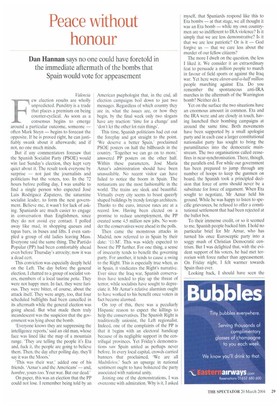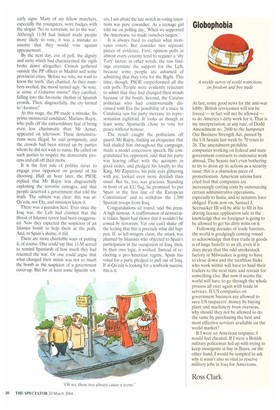Peace without honour
Dan Hannan says no one could have foretold in the immediate aftermath of the bombs that Spain would vote for appeasement
Valencia
Few election results are wholly unpredicted. Punditry is a trade that places a premium on being counter-cyclical. As soon as a consensus begins to emerge around a particular outcome, someone — often Mark Steyn — begins to forecast the opposite. If he is proved right, he can justifiably swank about it afterwards; and if not, no one much minds.
But if any commentators foresaw that the Spanish Socialist Party (PSOE) would win last Sunday's election, they kept very quiet about it. The result took everyone by surprise — not just the journalists and politicians but the voters, too. In the 72 hours before polling day, I was unable to find a single person who expected Jose Luis Rodriguez Zapatero, the saturnine socialist leader, to form the next government. Believe me, it wasn't for lack of asking. Spaniards are much easier to engage in conversation than Englishmen, since they do not avoid eye contact. I polled away like mad, in shopping queues and tapas bars, in buses and lifts. I even sampled a group of old ladies leaving Mass. Everyone said the same thing. The Partido Popular (PP) had been comfortably ahead even before Thursday's atrocity; now it was a dead cert.
This conviction was especially deeply held on the Left. The day before the general election, I chatted to a group of socialist voters, members of a local taurine pub. They were not happy men. In fact, they were furious. They were bitter, of course, about the attack itself. They were angry, too, that four scheduled bullfights had been cancelled in its aftermath while the general election was going ahead. But what made them truly incandescent was the suspicion that the government was lying about the bomb.
'Everyone knows they are suppressing the intelligence reports,' said an old man, whose face was lined like the map of a mountain range. They are telling the people it's Eta and, fuck it, the people are going to believe them. Then, the day after polling day, they'll say it was the Moors.'
'This was their war,' added one of his friends. `Aznar's and the Americans' — and, hombre, yours too. Your war. But our dead.'
On paper, this was an election that the PP could not lose. I remember being told by an American psephologist that, in the end, all election campaigns boil down to just two messages. Regardless of which country they are in, what the issues are, or how they begin, by the final week only two slogans have any traction: 'time for a change and 'don't let the other lot ruin things'.
This time, Spanish politicians had cut out the foreplay and got straight to the point. 'We deserve a better Spain,' proclaimed PSOE posters on half the billboards in the country. 'Together we can go on to more,' answered PP posters on the other half. Within these parameters, Jose Maria Aznar's administration should have been unassailable. No recent visitor can have failed to notice the boom in Spain. The restaurants are the most fashionable in the world. The trains are sleek and beautiful. Virtually every city seems to boast queerly shaped buildings by trendy foreign architects. Thanks to the euro, interest rates are at a record low. Having been elected on a promise to reduce unemployment, the PP created some 4.5 million new jobs. No wonder the conservatives were ahead in the polls.
Then came the monstrous attacks in Madrid, now referred to in Spain by their date: '11-M'. This was widely expected to boost the PP further. For one thing, a sense of insecurity tends to benefit the governing party. For another, it tends to cause a swing to the Right. This is especially true when, as in Spain, it vindicates the Right's narrative. Ever since the Iraq war, Spanish conservatives have tended to play up the threat of terror, while socialists have sought to depreciate it. Mr Aznar's relative alarmism ought to have worked to his benefit once voters in fact became alarmed.
On top of this, there was a peculiarly Hispanic reason to expect the killings to help the conservatives. The Spanish Right is traditionally unionist, the Left regionalist. Indeed, one of the complaints of the PP is that it begins with an electoral handicap because of its negligible support in the centrifugal provinces. Yet Friday's demonstrations saw Spain united as perhaps never before. In every local capital, crowds carried banners that proclaimed, 'We are all Madrilerios: Such an upsurge in national sentiment ought to have bolstered the party associated with national unity.
Joining one of the demonstrations, I was overcome with admiration. Why is it, I asked myself. that Spaniards respond like this to Eta bombs — at that stage, we all thought it was an Eta bomb — while my own countrymen are so indifferent to IRA violence? Is it simply that we are less demonstrative? Is it that we are less patriotic? Or is it — God forgive us — that we care less about the murder of our fellow citizens?
The more I dwelt on the question, the less I liked it. We consider it an extraordinary feat to persuade a million people to march in favour of field sports or against the Iraq war. Yet here were eleven-and-a-half million people marching against Eta. Do you remember the spontaneous anti-IRA marches in the aftermath of the Warrington bomb? Neither do I.
Yet on the surface the two situations have an enormous amount in common. Eta and the IRA were and are closely in touch, having launched their bombing campaigns at around the same time. Both movements have been supported by a small apologist party and in eaeh case a larger constitutional nationalist party has sought to bring the paramilitaries into the democratic mainstream. The two organisations called ceasefires in near-synchronisation. There, though, the parallels end. For while our government has been prepared to jump through any number of hoops to keep the gunmen on board, the Spanish took a principled decision that force of arms should never be a substitute for force of argument When Eta sought to negotiate. Mr Aznar held his ground. While he was happy to listen to specific grievances, he refused to offer a constitutional settlement that had been rejected at the ballot box.
To their immense credit, or so it seemed to me, Spanish people backed him. I hold no particular brief for Mr Aznar, who has turned his once Eurosceptic party into a soggy mush of Christian Democratic centrism. But I was delighted that, with the evident support of his voters, he had met terrorism with force rather than appeasement. On Friday night, I felt warmer towards Spain than ever.
Looking back, I should have seen the early signs. Many of my fellow marchers, especially the youngsters, wore badges with the slogan 'No to terrorism, no to the war'. Although 11-M had indeed made people more likely to vote, it was a mistake to assume that they would vote against appeasement.
By the next day, eve of poll, the dignity and unity which had characterised the vigils broke down altogether. Crowds gathered outside the PP offices in Madrid and some provincial cities. 'Before we vote, we want to know the truth,' they chanted. As their numbers swelled, the mood turned ugly. 'Se nota, se siente, el Gobiemo mietuer they carolled, falling into the favourite rhythm of Spanish crowds. Then, disgracefully, the cry turned to Asesinosi'
At this stage. the PP made a mistake. Its prime ministerial candidate, Mariano Rajoy, who pulls off the extraordinary feat of being even less charismatic than Mr Aznar, appeared on television. These demonstrations were illegal, he said pompously, and the crowds had been stirred up by parties whom he did not wish to name. He called on such parties to respect the democratic process and call off their mobs.
It is the first rule of politics never to engage your opponent on ground of his choosing. Half an hour later, the PSOE replied that Mr Rajoy was disgracefully exploiting the terrorist outrages, and that people deserved a government that told the truth. The subtext was clear: this was alOa'eda, not Eta, and ministers knew it.
There was a paradox here. Ever since the Iraq war, the Left had claimed that the threat of Islamist terror had been exaggerated. Now they expected the suspicion of an Islamist bomb to help them at the polls. And, to Spain's shame, it did.
There are more charitable ways of putting it, of course. One could say that 11-M served to remind Spaniards of how much they had resented the war. Or one could argue that what changed their minds was not so much the bomb as the suspicion of a government cover-up. But for at least some Spanish vot
ers, I am afraid the late switch in voting intentions was pure cowardice. As a teenage girl told me on polling day, 'When we supported the Americans, we made ourselves targets.'
It is always hard to explain what motivates voters. But consider two separate pieces of evidence. First, opinion polls in almost every country tend to register a 'shy Tory' factor: in other words, the raw findings overstate the support for the Left, because some people are ashamed of admitting that they vote for the Right. This time, though, PSOE outperformed all the exit polls. People were evidently reluctant to admit that they had changed their minds because of the bomb. Second, the Catalan politician who had controversially discussed with Eta the possibility of a truce in Catalonia saw his party increase its representation eightfold. It looks as though at least some Spaniards chose to vote for peace without honour.
The result caught the politicians off guard. Mr Rajoy, finding an eloquence that had eluded him throughout the campaign, made a model concession speech. He congratulated his opponent, said that his party was leaving office with the accounts in good order, and pledged his loyalty to the King. Mr Zapatero, his pale eyes glittering with joy, looked even more devilish than usual. But he, too, was gracious. Standing in front of an EU flag, he promised 'to put Spain in the first line of the European Constitution' and to withdraw the 1,300 Spanish troops from Iraq.
Congratulations all round, said the press. A high turnout. A reaffirmation of democratic values. Spain had shown that it wouldn't be cowed by terrorism. Yet one can't shake off the feeling that this is precisely what did happen. If, as left-wingers claim, the attack was planned by Islamists who objected to Spain's participation in the occupation of Iraq, then, by their own logic, it worked. Instead of reelecting a pro-American regime, Spain has voted for a party pledged to pull out of Iraq. If al-Qa'ecla is looking for a textbook success, this is it.



















































































 Previous page
Previous page